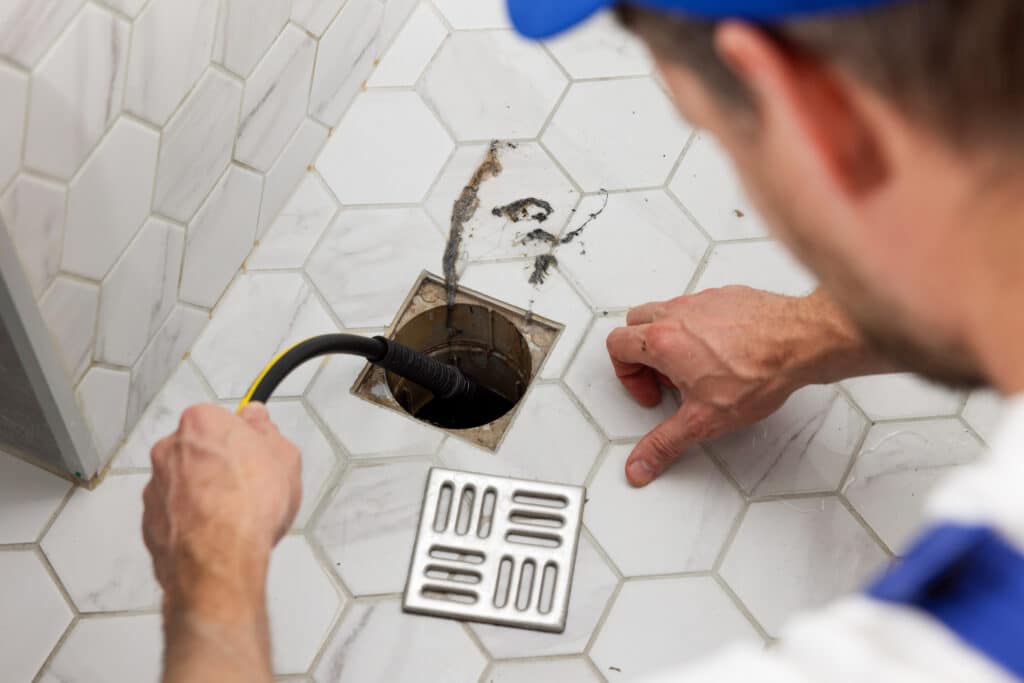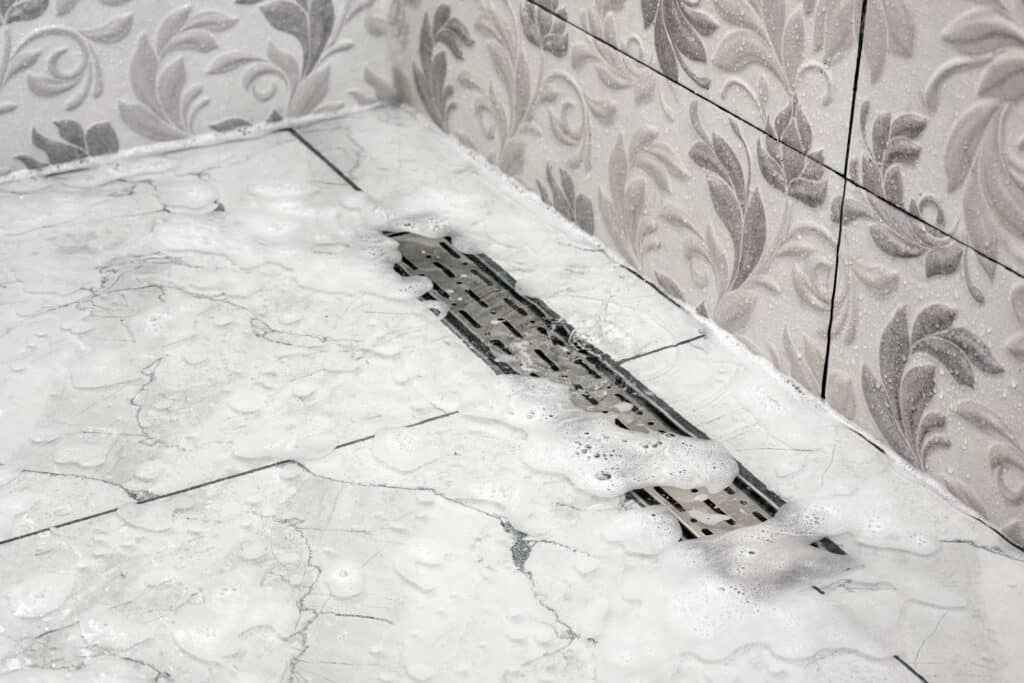A clogged shower drain can quickly turn your relaxing shower into a frustrating experience. If left unchecked, it can lead to water damage, foul odors, and even plumbing system failures. Homeowners in Clarksburg, MD, should be aware of the early warning signs to avoid costly repairs and potential health risks.
Recognizing the symptoms of a clogged drain early can save you time and money. Whether it’s slow-draining water, unusual noises, or persistent odors, these signs indicate a blockage that needs attention. Ignoring them can result in serious plumbing issues, including backups that affect other parts of your home.
In this article, we’ll explore five key warning signs of a clogged shower drain you should never ignore. Understanding these signs will help you take action before the problem worsens.
Slow Draining Water: The First Sign of Trouble
A clogged shower drain often starts with slow-draining water. If you notice water pooling around your feet and taking longer to disappear, it’s a clear sign of a developing blockage. This issue may seem minor at first, but it can quickly worsen if not addressed.
Several common culprits contribute to slow drainage. Hair, soap scum, and mineral buildup from hard water gradually accumulate inside the pipes. Over time, these materials create a partial clog that restricts water flow. If left untreated, the blockage can grow, leading to complete drain failure.
Ignoring slow drainage can cause further plumbing complications. As the clog worsens, water pressure increases, which may put stress on your pipes. This can result in leaks, water damage, or even burst pipes in severe cases. Additionally, standing water in your shower can become a breeding ground for bacteria and mold, posing health risks.
If your shower is draining slowly, don’t wait for the problem to escalate. A professional plumber can assess the issue and remove the clog before it leads to more serious plumbing concerns.

Standing Water in the Shower: A Sign of a Severe Clog
If water starts pooling around your feet and refuses to drain, you’re dealing with more than just a minor clogged shower drain—it’s likely a severe blockage. Standing water is a clear sign that the drain is nearly or completely blocked, preventing water from flowing through the pipes.
One major concern with standing water is its potential to foster bacteria and mold growth. A damp, stagnant environment creates the perfect conditions for mildew, which can lead to unpleasant odors and even respiratory issues. Additionally, prolonged exposure to standing water can weaken grout and tile, leading to costly bathroom repairs.
A fully clogged drain can also indicate a deeper issue within your plumbing system. In some cases, the blockage may extend beyond the shower drain and into the main sewer line, which could affect other drains in your home. If multiple fixtures are draining slowly or backing up, the problem may require immediate professional attention.
Ignoring standing water in your shower can lead to bigger problems, including potential water damage and structural issues. If you notice persistent pooling, calling a professional plumber is the best way to prevent further damage and restore proper drainage.
Unpleasant Odors Coming from the Drain: A Warning Sign
A clogged shower drain doesn’t just affect water flow—it can also create unpleasant odors in your bathroom. If you notice a foul smell coming from your drain, it’s a strong indicator that trapped debris, mold, or bacteria are causing buildup inside the pipes.
One of the most common causes of drain odors is organic matter like hair and soap scum breaking down over time. This decomposition releases foul-smelling gases, which become more noticeable as the clog worsens. Additionally, standing water within the drain can encourage mold and mildew growth, further contributing to bad odors.
Ignoring drain odors can lead to bigger problems. Persistent smells might indicate a deeper issue, such as a blocked vent pipe, which can impact your entire plumbing system. In some cases, unpleasant drain odors could also signal a more serious sewer line problem, which requires immediate professional attention.
If your shower drain emits a constant bad smell, it’s time to take action. A plumbing professional can diagnose the source of the odor, remove blockages, and ensure your pipes are properly ventilated to prevent future issues.
Gurgling or Bubbling Noises: A Sign of Air Trapped in the Pipes
Strange noises coming from your drain, such as gurgling or bubbling, are often a sign of a clogged shower drain. These sounds occur when air gets trapped in the pipes due to a blockage. As water tries to flow past the clog, it pushes air bubbles through the drain, creating an unusual noise.
In many cases, gurgling sounds indicate a partial clog that is restricting water flow. This can be caused by a buildup of hair, soap scum, or even small objects accidentally washed down the drain. If ignored, the blockage can worsen over time, leading to slower drainage and potential backups.
Another possible cause of bubbling noises is a venting issue. Plumbing systems rely on vent pipes to balance air pressure and allow water to flow smoothly. If the vent pipe is clogged or damaged, air can’t escape properly, causing odd sounds in your shower drain.
If you hear persistent gurgling from your drain, don’t ignore it. This issue can worsen and lead to more serious plumbing problems, including full blockages or sewer backups. A professional plumber can inspect your drain and vent system to determine the cause and restore proper drainage.
Water Backing Up into Other Drains: A Major Red Flag
If you notice water backing up into your sink or tub when you shower, it’s a strong indication of a clogged shower drain. This problem occurs when a blockage prevents water from draining properly, forcing it to find an alternate path through other plumbing fixtures.
In many homes, bathroom drains are interconnected. When one drain becomes clogged, water may reroute to the nearest available opening, leading to backups in sinks, tubs, or even toilets. This is a serious plumbing issue that can worsen over time if not addressed promptly.
One of the biggest risks of water backing up is potential contamination. When wastewater reverses direction, it can bring bacteria and unpleasant debris into clean areas. Additionally, persistent backups may indicate a deeper problem in your home’s main sewer line, which could lead to widespread drainage issues.
If you experience frequent backups in multiple fixtures, it’s time to call a professional plumber. They can assess whether the issue is localized to your shower drain or if a more serious blockage is affecting your entire plumbing system. Addressing the problem early can prevent costly repairs and ensure your home’s drainage system functions properly.
The Risks of Ignoring a Clogged Shower Drain
A clogged shower drain may seem like a small inconvenience, but ignoring it can lead to costly and even hazardous consequences. Delayed maintenance can result in water damage, mold growth, poor air quality, and expensive plumbing repairs. Understanding these risks can help homeowners take timely action to prevent a minor clog from becoming a major issue.
Structural Damage from Water Seepage
When water cannot drain properly, it may start to seep into surrounding surfaces, including floors, walls, and ceilings. Over time, this trapped moisture can weaken structural components, leading to rot, warping, and even foundational issues.
If left untreated, water damage can:
- Weaken wooden subfloors, causing instability.
- Lead to cracks in walls and ceilings due to moisture expansion.
- Cause tiles and grout to deteriorate, leading to bathroom repairs.
Addressing a clogged shower drain early helps prevent water from spreading into areas of the home that require expensive renovations.
Mold and Mildew Growth
A blocked drain creates the perfect environment for mold and mildew to thrive. When water stagnates in your shower, humidity levels rise, and bacteria multiply. This can lead to visible mold around the drain, shower walls, and even hidden mold growth behind walls.
Mold exposure can cause:
- Persistent musty odors in your bathroom.
- Increased allergy symptoms, such as sneezing, itchy eyes, and congestion.
- Respiratory problems, especially for those with asthma or weakened immune systems.
Once mold spreads, removing it becomes more difficult and expensive. Preventing mold starts with keeping your plumbing system in top condition.
Poor Indoor Air Quality
Standing water from a clogged shower drain doesn’t just affect your plumbing—it can impact the air you breathe. When bacteria and mold grow inside a damp drain, they release airborne spores and foul-smelling gases that can circulate throughout your home.
Signs of poor indoor air quality due to drain issues include:
- Persistent musty or sewer-like odors in your bathroom.
- Increased dust or humidity levels in your home.
- Worsening allergy symptoms or respiratory discomfort.
Proper ventilation and regular drain maintenance can help maintain fresh, clean indoor air. If bad odors persist, it may indicate a deeper issue within your plumbing system.
Increased Plumbing Repair Costs
What starts as a slow drain can quickly turn into a plumbing emergency. As blockages grow, they put additional pressure on pipes, leading to potential leaks, pipe bursts, or even sewer line backups. Ignoring early warning signs can result in costly repairs that could have been avoided with timely intervention.
Potential long-term costs of ignoring a clog include:
- Professional drain cleaning or hydro jetting services.
- Repairs for damaged pipes or fittings.
- Water damage restoration, including mold remediation and structural repairs.
Routine drain maintenance is always more affordable than emergency plumbing repairs. If you notice slow drainage, unusual noises, or water backing up, it’s best to call a professional plumber before the issue escalates.
Take Action Before It’s Too Late
Ignoring a clogged shower drain can lead to severe plumbing issues, health hazards, and unnecessary repair costs. The best way to prevent these risks is to address drainage problems as soon as they arise.
If you notice any signs of a blockage—such as slow-draining water, foul odors, or unusual noises—contact a professional plumber. Early intervention can save you time, money, and stress, ensuring your plumbing system stays in top shape for years to come.
Professional Solutions for Clearing a Clogged Shower Drain
When faced with a clogged shower drain, many homeowners attempt quick fixes, but professional solutions provide long-term results. Plumbers use specialized tools and techniques to remove blockages safely and effectively, preventing further damage to your plumbing system.
One common method is drain snaking, where a plumber inserts a flexible cable into the drain to break up and remove the clog. This technique works well for hair, soap scum, and small debris that accumulate over time. For more severe blockages, hydro jetting may be used. This process involves high-pressure water to flush out buildup, leaving pipes clean and free-flowing.
In some cases, a clogged drain may indicate a deeper plumbing issue, such as a blocked sewer line or improper venting. A professional plumber can perform a camera inspection, sending a small camera into the pipes to identify hidden problems. This technology allows for accurate diagnosis and targeted solutions.
Unlike chemical drain cleaners, which can damage pipes over time, professional services ensure safe and effective results. Regular maintenance and timely repairs can prevent recurring clogs, keeping your shower drain in optimal condition. If you’re experiencing persistent drainage issues, consulting a plumber is the best way to restore proper water flow and protect your home’s plumbing system.
Preventing Future Shower Drain Clogs
While a clogged shower drain can be frustrating, regular maintenance can help prevent future blockages. By adopting a few simple habits, homeowners can keep their drains clear and avoid costly plumbing issues.
One of the easiest ways to prevent clogs is by using a drain cover. These inexpensive screens catch hair, soap residue, and debris before they enter the pipes. Cleaning the cover regularly ensures that water flows freely down the drain.
Another effective prevention method is routine drain cleaning. Flushing the drain with hot water once a week can help dissolve minor buildups. For extra protection, enzymatic drain cleaners provide a safe, natural way to break down organic materials without damaging pipes.
Homeowners in Clarksburg, MD, should also be mindful of hard water buildup. Over time, minerals from hard water can accumulate inside pipes, contributing to slow drainage. Installing a water softener can help reduce mineral deposits and extend the life of your plumbing system.
Regular professional inspections can catch early signs of trouble before they turn into major issues. A licensed plumber can remove small blockages, check for hidden problems, and provide maintenance tips to keep your shower drain functioning properly. Preventive care is always easier and more affordable than dealing with a major clog.

FAQ: Common Questions About a Clogged Shower Drain
1. What causes the most common shower drain clogs?
A clogged shower drain is usually caused by a buildup of hair, soap scum, and mineral deposits from hard water. Over time, these materials accumulate inside the pipes, restricting water flow and leading to a fully clogged shower drain. Ignoring early signs can cause the blockage to worsen, making it harder to clear.
2. Can a clogged shower drain lead to pipe damage?
Yes, a clogged shower drain can lead to significant plumbing issues if left untreated. When water cannot drain properly, pressure builds up inside the pipes, potentially causing leaks, cracks, or even burst pipes. Standing water from a clogged shower drain can also seep into bathroom walls and floors, leading to mold growth and structural damage.
3. Are chemical drain cleaners safe to use for a clogged shower drain?
Most store-bought drain cleaners contain harsh chemicals that can weaken your pipes over time. While they may provide a temporary fix for a clogged shower drain, frequent use can lead to corrosion and expensive plumbing repairs. Instead of relying on chemicals, professional drain cleaning methods offer a safer and more effective way to clear a clogged shower drain.
4. How often should I clean my shower drain to prevent clogs?
To reduce the chances of a clogged shower drain, it’s best to clean your drain at least once a month. Removing hair from the drain cover and flushing the drain with hot water or an enzymatic cleaner can help prevent buildup. Regular maintenance helps keep your pipes free from debris, reducing the risk of dealing with a stubborn clogged shower drain.
5. When should I call a plumber for a clogged drain?
If your shower drain is slow, gurgling, or emitting foul odors, it’s best to call a professional. If multiple drains in your home are backing up, it could indicate a more serious issue, such as a sewer line blockage.


